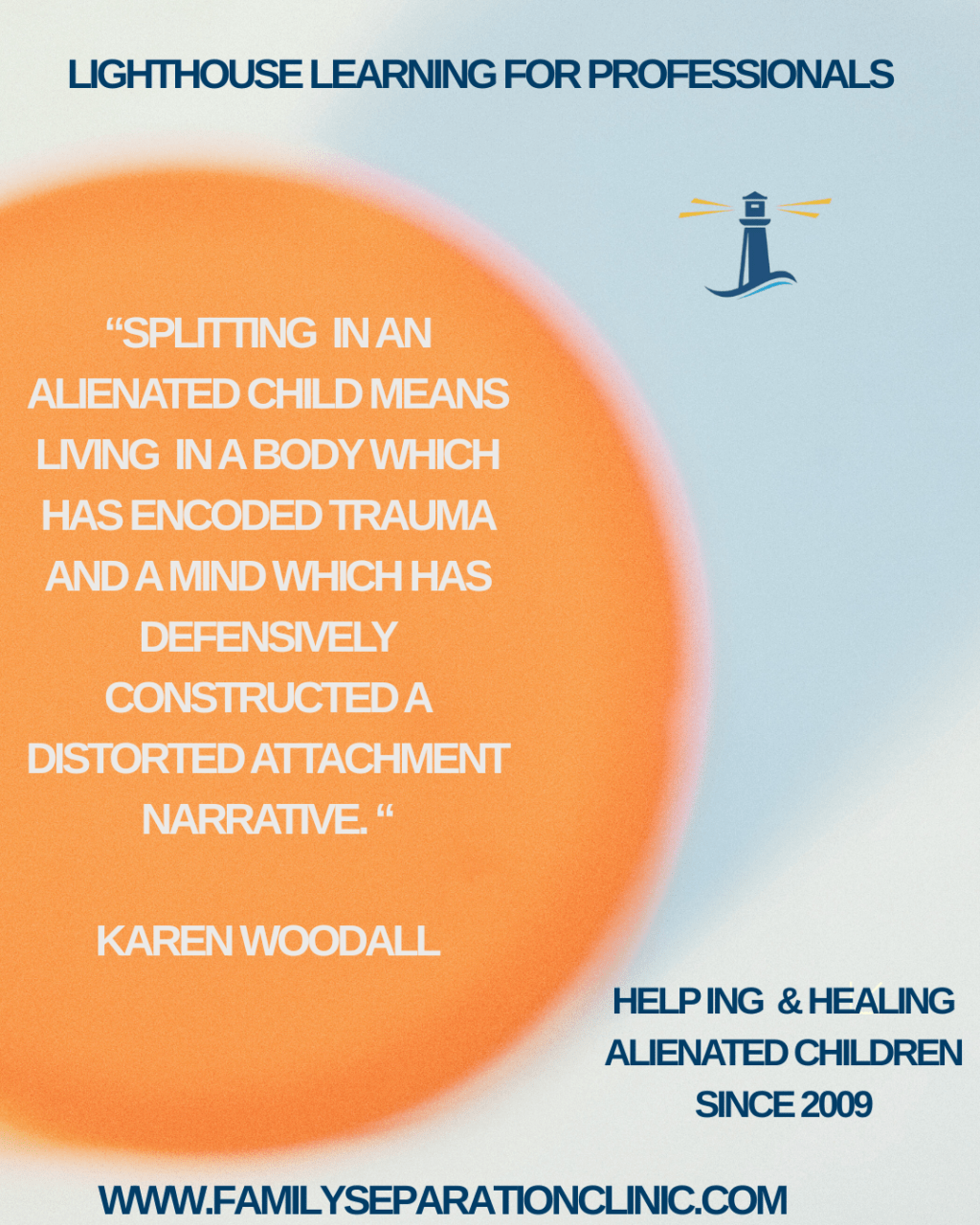I have worked in many cases where parental alienation is featured and some where it is alleged but on investigation it is not present. In these cases, in which children actually are withdrawn from a parent, there are distinct features which allow us to determine that it is not parental alienation. Unfortunately, in the investigation, it becomes apparent that the allegation of parental alienation is being used to either further control behaviours in the parent making it, or that the parent has some problems which are contributing to the child’s withdrawal. The common denominator in all of these cases are the behaviour of the parent from whom the child has withdrawn, which is often fixed and rigid in presentation and which escalates in determination that the other parent is to blame when one attempts to intervene.
Learning how to tell the real case of parental alienation from the alleged one is a core early skill for a practitioner. Naive practitioners will assume that all reports of a child’s withdrawal is being caused by the dynamics between parents or, conversely, will assume that all cases have an element of he said/she said about them. In reality, the case of parental alienation is distinctly different from all other cases in that the child concerned will present with the eight signs of alienation, the more rigidly and clearly delineated in the child, the more severe the alienation reaction.
I have some parents who come to me and tell me that they are alienated from their children and when I ask them ‘when did you last see your child’ they tell me ‘last week.’ On further investigation, many will tell me that they are seeing their child regularly but they are still being alienated from them, meaning that the child does not respond in the way that the parent expects them to and is showing some signs of transitional difficulty. This is not parental alienation. It is possibly not even anything to do with the other parent. The problem being that this parent is convinced that the child is behaving as they are because they are being alienated from them by the other parent. And in some cases, there is nothing that I can do to convince them otherwise. These are tragic cases in my view because the parent who is alleging parental alienation is making a case out of their own fears, lack of understanding and parenting style which does not fit the child’s needs at the current time. With a little open mindedness, these parents could be helped enormously. Sadly the rigidity of thinking means that they cannot be and they will often move on to find others who will uphold their world view, rather than receive the help that they need to change the dynamic which is impacting upon their child.
Not all children who are withdrawn from a parent are alienated. Some find it hard to make the crossing to and fro between parents, especially when they reach a certain age and their friends are more interesting to them than their parents. Others find it difficult to adjust to two very different parenting styles and then there are the natural phases of a child’s life, where they will become more attunded and aligned with one parent than the other. All of these are normal phases of children’s lives in separated family situations and all can be addressed by parents who have the right information and skill to deal with it. For the rigid and closed thinking parent however, the one who divides their beliefs into right and wrong and for the parent who believes that they need do nothing to change their behaviours because the problem is entirely caused by the other parent, the risks of children’s withdrawal are very very strong.
Children are not alienated when they can continue to see a parent. They are not alienated when they can skype a parent and they are not alienated when they can speak directly to a parent by any medium. Some children who I have been told are alienated, are struggling to communicate with a parent who is convinced that they are alienated and who is spending a lot of time telling the child that this is the case. In this situation the child is completely disadvanatged because the parent they are spending time with is attempting to convince them that the other parent is influencing them. If the child is simply reacting to the dynamics this parent is creating, the child is left bewildered because they experience that parent as trying to influence them whilst having to listen to the parent telling them that they are being influenced by the other parent. This creates such cognitive dissonance for children that I have known them withdraw from a parent on the basis of this alone. The space between two parents is so difficult for a child to navigate that no parent should be telling a child that they are being influenced by the other in my opinion. To do so is to absolve oneself of responsibility and force the child to carry the can for a situation the child did not ask for or create.
Children who are alienated can be clearly differentiated from those who are simply not able to cope with the dynamics around them caused by one or other or both of their parents. Children who are alienated will withdraw COMPLETELY and will demonstrate all of the signs of alienation in a range of presentations from mild to severe. On further investigation, a parent who is alienating a child will also display particular signs and the parent who is rejected will be a good enough parent who is not rigid in their thinking or fixed in beliefs. This parent will respond to challenges to tweak, shift or change behaviours and will not spend their time projecting blame onto the other parent.
A child who is withdrawing from a parent because that parent is rigid and fixed and projecting blame towards the other parent will not show all the signs of alienation and will be able to describe, in ways which are conversant with your own observations, those behaviours which are causing the problem. As a practitioner, when this is observed, the next step is to gently but firmly work with that parent to explain what is happening and offer support for behavioural change. It is at this stage when the reveal of the false allegation of parental alienation is most often apparent as the parent turns their blame projection onto you the practitioner. When this occurs, the parent will seek to find others whom they can convince of their story in order to form a coalition against you the practitioner. Often parents in these circumstances will go to parental rights groups to complain and will seek to enlist other practitioners to support their belief that they are being alienated. This is the parent acting to shore up their defence against the reality that their own behaviours have contributed to the child’s responses. Some parents in these circumstances, rather than find ways of changing their behaviours to help their child, will continue their blame projection in order to uphold the belief that they are perfect and the other parent is wholly and solely to blame. As practitioners working in the field of parental alienation, we cannot avoid this dynamic but we absolutely must differentiate between real and false allegations of parental alienation if we are to properly help the child. To put a child who is not alienated but reacting to congruent dynamics caused by a parent, into a situation where they are not being listened to, is as abusive as not acting to help a child who IS being alienated. Knowing the difference between the two and having the courage to do the right thing for the child is a crucial skill for practitioners.
And this is why practitioners who work in this field should be working with a focus upon the child and not parents. Whilst I have every sympathy for parents who are alienated and will go as many extra miles as is necessary to help them to reunite with a child, it is not the parent I am concerned with most but the child. This is because the child who is alienated is in a difficult psychological space, not just in the here and now but for the rest of their lives. Changing the trajectory of the alienated child’s life is key for me which is why I view rejected parents as core resources to restore the child’s right to peace and unconscious enjoyment of the childhood left to them. In false allegations of parental alienation however, I view the parent with whom the child lives as the core resource to enable the child to return to the unconscious enjoyment of childhood. It is not that I am not interested in parental experience, I am. But I do not view this work as being about the rights of parents, it is about the rights of children to a childhood which is healthy, safe and most of all unconscious of the adult concerns around them.
Which means in the case of what turns out to be a belief in a parent that they are being alienated which is untrue, I will say so. And in saying so I will not have any difficulty in ensuring that the parent who is alleging alienation, understands that it is not, why it is not and what it is that they have done which has caused the child’s withdrawal. And in doing so I understand that I am drawing the negative transference and risking that parent turning their distorted beliefs towards me. I will of course, always offer that parent the opportunity to work through the negative transference but at the same time I will ensure that the child is protected from any further pressure caused by the belief that the difficulties seen are parental alienation. To fail to do that would be to fail to do what I do properly. In the final reveal however, when we reach this point, such a parent will most often refuse to listen or engage any further.
Parental alienation is a powerful presentation and it causes untold harm to children. A false allegation of parental alienation is equally as powerful and damaging. Telling the difference, speaking the difference and protecting the child, is one of the most powerful things that a practitioner can do.
We must act and speak for the children who cannot do so whether they are alienated or not. Because this is about the wellbeing of children first, the children who did not choose to live in a separated family situation.
If it is a false allegation I will say so because it is not the role of the child to carry the responsibility for the wellbeing of a parent, it is the other way around.




Leave a reply to karenwoodall Cancel reply